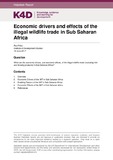Economic Drivers and Effects of the Illegal Wildlife Trade in Sub-Saharan Africa
Abstract
This rapid literature review examined the economic drivers and effects of the illegal wildlife trade (IWT) in Sub-Saharan Africa. Evidence from case studies have been used to highlight these different motivations and effects where possible, however, evidence is patchy across Sub Saharan Africa. There are a large number of knowledge gaps around IWT, including the socio-economic profiles of different actors involved, and IWT is often a symptom of deeper underlying forces involving political, social and economic dynamics and broader patterns of land use change. The literature reviewed was generally gender blind, although some case studies found that it was often young men who took part in illegal hunting and the IWT. Key findings include motivations for the IWT vary greatly from location to location, depending on the actors involved and the goods being traded; it is particularly challenging as it involves multiple dimensions, including poverty, governance and is often hidden in legal trade. Generally, wealth rather than poverty was found to be the ultimate driver in IWT, in that individuals from poor communities would not engage in the poaching of commercially valuable species unless there was demand from wealthier communities/countries. Furthermore, the role of the colonial history of separation of people and wildlife in driving wildlife crime is an important yet often overlooked factor. By its nature IWT is clandestine, hence empirical evidence and the evidentiary base for policy discussion is often weak and so the ability to fully answer the question is limited. Strength of evidence from different Sub Saharan African countries varied greatly and there are few in depth studies into drivers of IWT in these countries as a whole (Kenya and Uganda were the exceptions). Case studies are often specific to the particular location studied within the country (often around protected areas or National Parks). Final finding is impacts on poor countries and people in Sub Saharan Africa from the IWT are not well studied or fully quantified. The effects vary widely, can be both positive and negative, and are not evenly distributed among people in a community or country. Generally, IWT has a net positive short-term impact on individuals, and a net negative long-term impact on communities and countries as a whole.
Citation
Price, R.A. (2017). Economic drivers and effects of the illegal wildlife trade in Sub Saharan Africa. K4D Helpdesk Report. Brighton, UK: Institute of Development StudiesIs part of series
K4D Helpdesk Report;144Rights holder
© DFID - Crown copyright 2017.Collections
- K4D [937]

